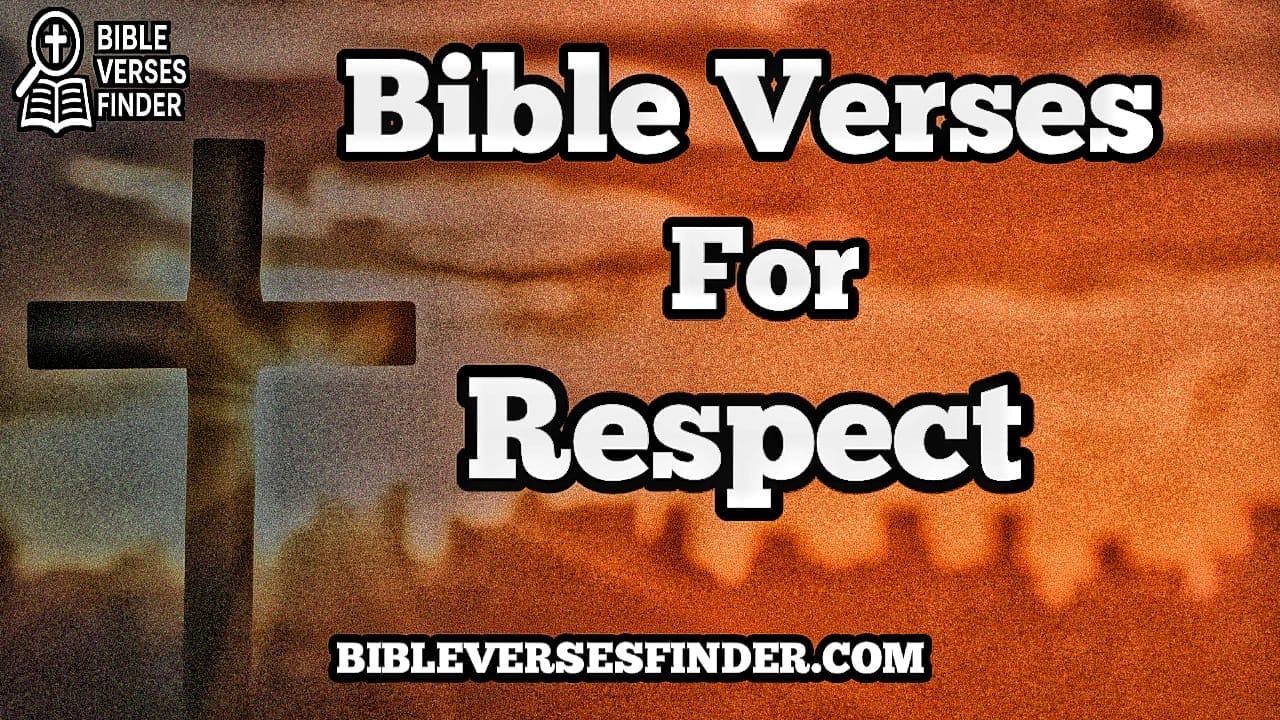Permit me to start by saying, in today’s fast-paced and often self-centered world, respect can feel like a fading virtue. We see arguments erupt over small disagreements, insults thrown across social media, and people disregarding one another’s feelings, experiences, and worth. Yet, the Bible calls us to a higher standard, one rooted in love, humility, and honor.
Must Read: 20+ Inspiring Simple Bible Verses For Kids Now

Respect, according to Scripture, isn’t just about manners or politeness. It’s about recognizing the God-given value in every person. It’s about treating others not as objects or obstacles, but as souls deeply loved by the Creator. Whether it’s showing honor to parents, kindness to strangers, or reverence toward God Himself, the Bible consistently teaches that respect is an essential expression of faith.
Also Read: 21+ Most Beautiful Bible Verses for a Daughter
Respect Begins with Reverence for God
Proverbs 1:7 (NIV):
“The fear of the Lord is the beginning of knowledge, but fools despise wisdom and instruction.”
The foundation of all respect is our reverence for God. The “fear” mentioned here doesn’t mean terror; it refers to awe, reverence, and deep respect for God’s holiness and authority. When we truly honor God, we begin to see the world and others through His eyes.
Respecting God means acknowledging His wisdom above our own, obeying His Word, and walking in humility. It means trusting that His ways are right, even when they challenge us. When our hearts are aligned with reverence for Him, respect naturally flows out to others because we see them as His creation.
Every act of respect toward people begins with a heart that honors God first. When you submit to His will, you learn to treat others with grace, patience, and love.
READ: 28+ Inspiring Spring Bible Verses To Know Today
Respect for Parents: Honoring the First Relationship of Authority
Exodus 20:12 (NIV):
“Honor your father and your mother, so that you may live long in the land the Lord your God is giving you.”
The command to “honor your father and mother” is the first commandment that comes with a promise — long life and blessing. God values family structure, and respect within it is essential.
Honoring parents doesn’t mean you must agree with everything they say or do, but it means recognizing their role in your life. Even when parents fall short (as all humans do), God still asks us to approach them with respect, forgiveness, and love.
For children, this may mean listening and obeying. For adults, it may mean caring for aging parents, showing appreciation, or speaking kindly of them. Respect strengthens families and passes down a legacy of love.
Respect for Others: Seeing the Image of God in Every Person
1 Peter 2:17 (NIV):
“Show proper respect to everyone, love the family of believers, fear God, honor the emperor.”
This verse beautifully summarizes how we should treat people: everyone deserves respect, believers deserve love, God deserves reverence, and leaders deserve honor.
Respect doesn’t depend on social status, race, background, or opinions. Every person bears the image of God (Genesis 1:27), and that alone gives them inherent worth. Even when we disagree with someone politically, culturally, or personally, the Bible calls us to treat them with kindness and dignity.
Respect Through Love and Service
Romans 12:10 (NIV):
“Be devoted to one another in love. Honor one another above yourselves.”
This verse captures the essence of Christian humility. To “honor others above yourself” means to willingly place the needs, feelings, and dignity of others before your own pride.
Respect isn’t about superiority; it’s about service. Jesus Himself modeled this when He washed His disciples’ feet (John 13:14-15). The King of kings knelt to serve, showing that the greatest form of respect is humble love.
In relationships, respect looks like listening more than speaking, giving without expecting in return, and celebrating others’ successes without envy. When we love selflessly, we mirror God’s heart.
Respect for Authority: Trusting God’s Order
Romans 13:1 (NIV):
“Let everyone be subject to the governing authorities, for there is no authority except that which God has established.”
This verse reminds us that respect extends beyond personal relationships — it applies to leaders and institutions as well. Whether we agree with those in power or not, Christians are called to show respect, obey laws, and pray for those in authority (1 Timothy 2:1–2).
Of course, respect doesn’t mean blind obedience to injustice. When earthly laws contradict God’s Word, we must stand for righteousness. Yet, even in disagreement, God expects us to respond with integrity and grace, not rebellion or hate. True respect recognizes God’s sovereignty. Even when human systems fail, we trust that He is still in control.
Respect in Speech: Letting Grace Govern Our Words
Ephesians 4:29 (NIV):
“Do not let any unwholesome talk come out of your mouths, but only what helps build others up according to their needs.”
How we speak reveals what’s in our hearts. Words can uplift or destroy, heal or wound. Respect is often expressed through the tone, timing, and truthfulness of our speech.
The Bible encourages us to use words that build others up. Even correction should be done in love and gentleness, not out of anger or pride. Respectful speech invites peace and understanding where conflict could otherwise thrive.
Respecting Boundaries and Human Dignity
Philippians 2:3–4 (NIV):
“Do nothing out of selfish ambition or vain conceit. Rather, in humility value others above yourselves, not looking to your own interests but each of you to the interests of the others.”
Respect is also about boundaries, recognizing that others have their own space, choices, and emotions. When we act out of selfish ambition, we disrespect the image of God in others.
But when we walk in humility, we begin to value others’ perspectives and well-being. Respect means listening without judging, helping without controlling, and loving without expecting repayment. In friendships, workplaces, and families, mutual respect fosters harmony and trust. It allows people to grow in freedom, not fear.
Respect Reflects Our Faith to the World
Matthew 7:12 (NIV):
“So in everything, do to others what you would have them do to you, for this sums up the Law and the Prophets.”
The Golden Rule is perhaps the clearest expression of respect. It invites us to treat others with the same love, care, and understanding we wish to receive.
Our behavior toward others reflects our relationship with God. When we respect others — even those who mistreat us we shine Christ’s light into dark places. The world notices a believer who treats others with kindness and integrity. Every act of respect can become a quiet sermon a living testimony of God’s grace in action.
Frequently Asked Questions About Bible Verses on Respect
1. What does the Bible say about respecting those who hurt you?
The Bible teaches that we should still show love and respect even to those who mistreat us.
Matthew 5:44 (NIV) says, “But I tell you, love your enemies and pray for those who persecute you.”
Respecting someone who has hurt you doesn’t mean allowing them to harm you again it means refusing to repay evil with evil. By responding with grace and prayer, you reflect the mercy of Christ and free yourself from bitterness.
2. How can I teach my children to respect others according to the Bible?
Teaching respect begins with example. Children learn best by observing how adults treat others. Encourage them with verses like Ephesians 6:1–3, which says, “Children, obey your parents in the Lord, for this is right. ‘Honor your father and mother.’”
Also, teach them to speak kindly, share generously, and show empathy. Reading Bible stories that highlight humility and kindness (like the Good Samaritan in Luke 10:25–37) helps them understand that true respect flows from love.
3. What’s the difference between respect and fear in the Bible?
In Scripture, “fear” often refers to reverence or awe, not terror. When the Bible says we should “fear the Lord” (Proverbs 9:10), it means to deeply respect and honor God’s holiness and authority. Respect for God leads to obedience, while fear in the worldly sense often leads to avoidance. God desires loving reverence, not frightened submission.
4. Should we respect people who don’t respect us back?
Yes, because our respect is an act of obedience to God, not a reaction to others’ behavior. Romans 12:17 (NIV) says, “Do not repay anyone evil for evil. Be careful to do what is right in the eyes of everyone.”
When you choose to stay respectful, even when disrespected, you demonstrate spiritual maturity and show that your character is rooted in Christ, not in circumstances.
5. How can I develop a more respectful attitude in daily life?
Start by practicing gratitude and humility. Recognize that everyone you meet is created in God’s image. Pray daily for a heart that sees others with compassion.
Also, meditate on Philippians 2:3–4, which reminds us to “value others above yourselves.” Speak kindly, listen without interrupting, and be quick to forgive. Over time, these small acts of consideration grow into a lifestyle of godly respect.
Summary
Respect isn’t just a moral lesson; it’s a spiritual lifestyle. It flows from a heart that honors God, loves others, and walks humbly. When we respect God, we gain wisdom. When we respect others, we reflect His love.
Imagine a world where people truly live out respect, the way Scripture teaches, where children honor parents, leaders serve with humility, and neighbors treat one another with compassion. That is the kind of world God calls us to build, one heart at a time.
So today, let’s commit to living out these verses, not just knowing them, but embodying them. Let your words be gentle, your actions honorable, and your heart filled with reverence. Respect is love in action, and love, as the Bible says, never fails. Stay with us as we keep you always updated.





